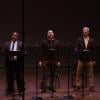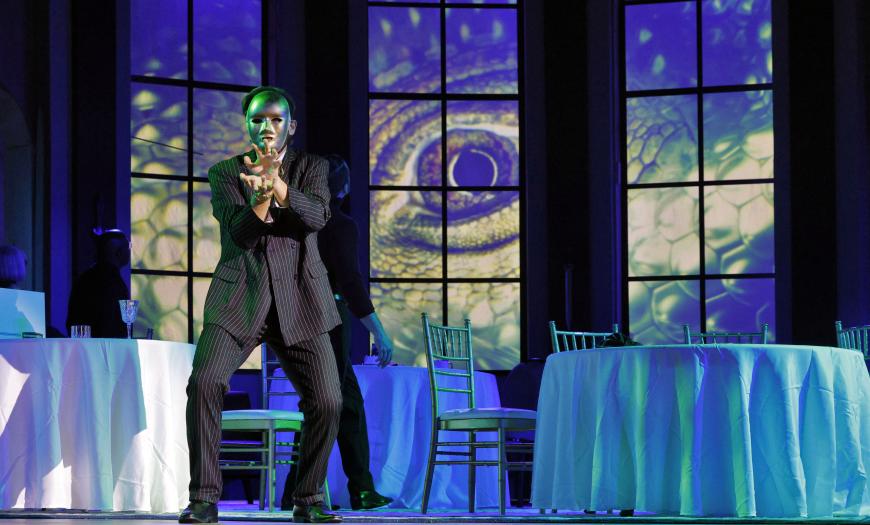
Richard Wagner’s Der Ring des Nibelungen: four operas, 15 hours running time (not counting intermissions), a busload of main characters, and an orchestra of over 100 (not to mention offstage anvils). It’s no wonder that in the 150 years since its first full performance at Bayreuth, efforts to tame the work’s heroic scale have been as numerous as pieces of gold in the Nibelung’s treasure hoard. Among these are two comic masterpieces — comedian Anna Russell’s hilarious synopsis and Bugs Bunny’s “What’s Opera, Doc?”
Legend of the Ring, a serious one-opera version of Wagner’s cycle, opened on Sunday at West Edge Opera. Credited to German opera producer David Seaman, this abbreviated Ring runs just short of four hours, including intermission, and features only eight singers, who manage 21 different roles among them. The current Legend production at Oakland’s Scottish Rite Center is the third time West Edge has presented this Ring reduction — the most recent was in 2010 at El Cerrito Performing Arts Theater.
Legend takes an episodic approach to the vast sweep of Wagner’s mythic saga. Even though these complicated stories of medieval mayhem necessarily suffer in the compression, the adaptation is mostly free of plot lurches and sudden displacements. Still, the result is overall mixed.
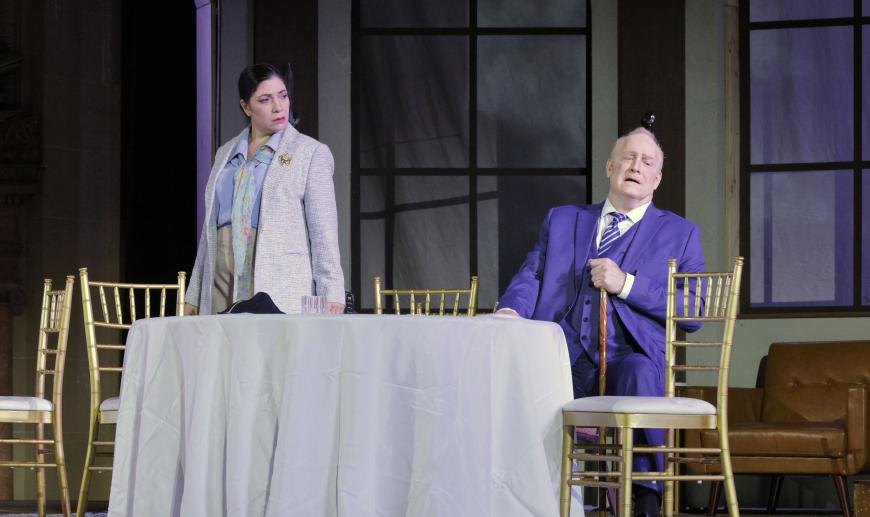
On the one hand, there was a good deal of excellent singing and convincing support from a drastically reduced orchestra on Sunday — and a heroic commitment to engaging the entire story, if only in snippets. But the overarching decision to abridge and yet try to deliver the entire story puts too many demands on the performers and the audience. Even the shortened version seems far too long — and at the same time exhausting in its almost constant changes of setting, mood, and plot. Without Wagner’s admittedly overlong scenes, it’s difficult to develop character and nuance.
This production, staged in modern dress, centers on the struggles of a billionaire capitalist (Wotan) who overcommits (he’s building a mega-mansion called Valhalla) and has to turn some very dirty tricks to try to survive financially. As Wotan, San Francisco Opera stalwart Philip Skinner provided a firm point of reference amid the confusing action with his striking stage presence, formidably commanding bass-baritone voice, and stunningly clear German diction. In his hands, Wotan is a gripping combination of pride, arrogance, cruelty, and tenderness.
Wotan’s wife is the goddess Fricka, who demands that her husband face up to the consequences of his multiple adulteries. As Fricka, mezzo-soprano Stephanie Sanchez faced him off with steely indignation. In contrast, Wotan’s daughter, Brünnhilde (soprano Tracy Cox), refuses her dad’s orders and pays a heavy price for doing so (the famous ring of fire).
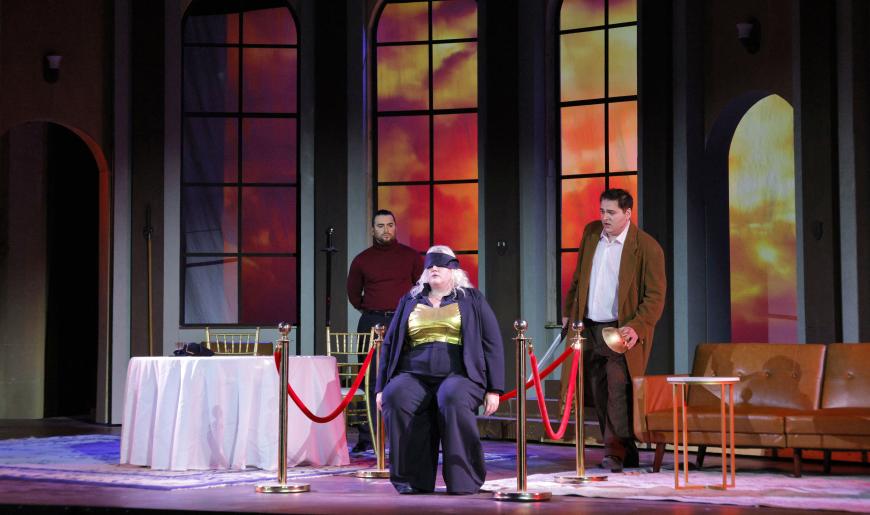
When the hero Siegfried (tenor Alex Boyer) breaks through the fire, accompanied by his famous horn calls, to wake and wed the sleeping Valkyrie, one might hope for a happy ending — in vain, of course. There’s a literal curse on everyone who possesses the ring — a curse memorably delivered by the Nibelung dwarf Alberich (bass-baritone Peter Morgan) and resonating throughout the cycle.
Wagner intended for the orchestra to tell us almost everything: where we are (the waters of the Rhine, the forest, the mountaintop, the halls of Valhalla) and what’s going on (sorrow, anger, complicity, revenge). In West Edge’s production, the composer’s massive demands are handled by just 15 uniformly excellent players, led by Musical Director Jonathan Khuner with a firm and sensitive hand. (Alas, though, there was no time to have them play the “Ride of the Valkyries”!)
The light touch in orchestration, Khuner’s excellent attention to dynamics, and strong singing by all the principals combined to offer an unusually balanced musical acoustic, even in the cavernous space of the Scottish Rite.
The production, directed by Sam Helfrich, gives a modern twist to Wagner’s fable about family cruelty and greed — an admirable goal, but carried through with limited success. Modern dress makes sense for economy (cheaper costuming) and relevance — but here it diminishes the power of the music and action.
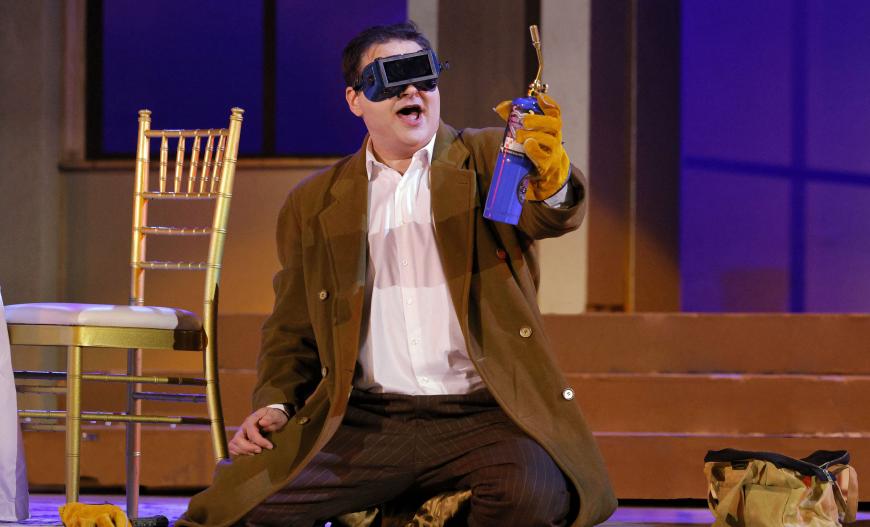
The Rhinemaidens guard their gold in a handbag. Siegfried forges his sword with a tiny hammer and handheld blowtorch. Valhalla looks like a mid-century casino, cluttered with party tables that impede the action. Rhinemaidens and Valkyries in little-girl dresses are not particularly convincing for this mythic drama. Brünnhilde’s ring of fire as red velvet ropes risks laughter where pathos would be more appropriate.
A black-box set and neutral costuming would have made it easier on Sunday to appreciate the production’s presumed goal of delivering the Ring cycle to those of us who can’t commit to four nights at the opera.
There are two more performances of Legend of the Ring, on Aug. 9 and 17, in repertory with West Edge Opera’s other two productions this summer, Bulrusher and Jacqueline.



